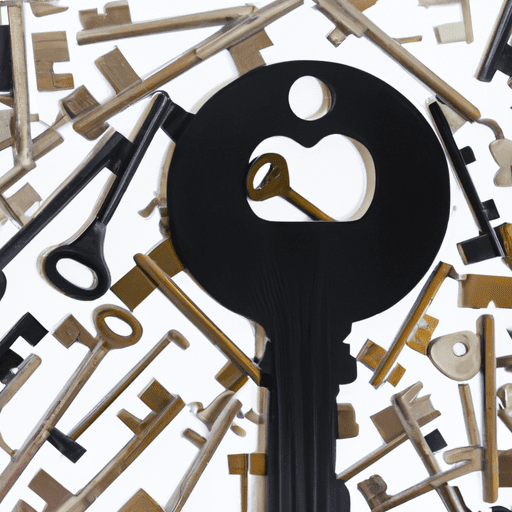Home » Knowledge Base » Technology »
Private Key
Understanding Bitcoin – The Importance Of The Seed And Private Key

The important role of a private key in Bitcoin cannot be overstated. They not only protect your Bitcoin, but also establish the exclusive ownership of your funds. This article delves into the intricacies of Bitcoin’s private keys. Unravelling their importance in safeguarding your digital wealth.
Alongside securing your Bitcoin transactions, private keys are the definitive proof of your ownership over your Bitcoin. They function as digital signatures, validating the authenticity of each transaction. Through the course of this page, we will further expand on the pivotal role of private keys in the Bitcoin universe.
What is a Private Key?


A private key, an integral component of Bitcoin transactions, is a confidential numerical secret that allows the owner to transfer bitcoins from their exclusive address by authenticating ownership via a signature. Attaining full control and monetary sovereignty over their bitcoins, this key is known solely to its creator and can be generated either manually or by utilising specialised random number generator software. The security of private keys is uncompromised due to the astronomical numeral possibilities.
A private key is boasting 256 bits or 64 characters with 2^256 possible combinations, it is virtually impossible for anyone to guess the correct key, even for the most powerful supercomputers. The public key (?) is publicly visible to the Bitcoin network. This key is derived from the private key through a complex mathematical process called elliptic curve multiplication, but it is impossible to derive the private key from the public key. It is a one-way function, it fortifies Bitcoin network’s security by preventing the reverse derivation of the private key from the public key.
What is a Seed?


When dealing with Bitcoin wallets, the generation of a seed, typically following the BIP39 protocol, is often the first step. A seed is a string of 12 to 24 English words and serves as a crucial backup for your Bitcoin wallet. From this seed, your private key is produced. It’s important to note that the private key and the seed hold the same level of importance as they both need to be handled with extreme caution due to their significance in securing your Bitcoin wallet.
In addition, several wallets provide the option of a passphrase or a hidden wallet feature. This functionality allows users to create an extra word, thereby enhancing the security of their wallet. This added security measure also empowers users with the ability to access various addresses.
Understanding the importance of a private key or seed in the world of Bitcoin is crucial. It is akin to a digital signature, giving the holder the power to access and manage their Bitcoin holdings securely. Thus, the private key should be kept confidential at all times. Mismanagement or loss of your private key can lead to irreversible consequences such as losing access to your Bitcoin wallet and its contents permanently.
Use Different Keys For One Address With Multisignature


Bitcoin addresses the potential security risk of a single private key through the implementation of multisignature (multisig). This advanced feature introduces the requirement of multiple private keys to authorise a Bitcoin transaction. It’s a strategic approach to enhance security, effectively safeguarding your Bitcoin assets even if a private key is compromised or lost.
By necessitating more than one private key, it ensures that your bitcoins remain secure and inaccessible to unauthorised individuals. This method not only minimises the risk of a central point of failure, but also provides a robust solution that delivers an extra layer of security to your Bitcoin transactions.
Master Private Keys and Derivation Paths


A master private key—more commonly referred to as an x-priv—is a critical component in Bitcoin management. It is generated from the combination of a seed and a chain code, forming the backbone from which an infinite array of child keys can blossom. Each of these child keys is equipped with the ability to create its unique public key and corresponding Bitcoin address.
The hierarchical nature of this system facilitates convenient and efficient organisation, making the management of multiple addresses within a singular wallet a hassle-free task. Even the most complex wallets can be navigated with ease thanks to the use of BIP-32 derivation paths. Which serve as reliable roadmaps for different child keys
Best Practices for Private Key Security


Securing your bitcoins necessitates the careful handling of private keys, which are integral to your Bitcoin safety. It’s essential to backup your private key, creating multiple copies stored in various secure, physical locations. Considering hardware wallets such can offer an additional layer of protection. These devices store your keys offline, away from potential cyber threats.
Stay vigilant against phishing attacks, as these duplicitous endeavors seek to trick you into revealing your keys or other personal details. Ensure you’re dealing only with authentic websites and steer clear of dubious links. Furthermore, keeping your Bitcoin wallet software up-to-date is paramount, as this guarantees you’re equipped with the most recent security enhancements and patches.
Implementing multisignature helps distribute risk and bolster bitcoin security, while alternatives like Shamir’s Secret Sharing (?) can eliminate the central risk of a single private key. Inserting passphrases also adds an extra layer of protection to your bitcoins. Embrace these strategies to elevate your private key security and safeguard your bitcoin investment.
Best Hardware Wallets To securely Store Your Keys
Given the crucial role that private keys play in securing your digital assets, it is important to store them in a safe and secure manner. Hardware wallets, which offer robust security features to protect your private keys, are widely considered to be one of the best options for this purpose. In the following list, we have compiled some of the top hardware wallets that are lauded for their exceptional security measures and user-friendly interfaces.
- Coldcard Q1
- Coldcard MK4
- Keystone 3 Pro
- Keystone 3
- Blockstream Jade
- Passport
- Trezor Model T
- Trezor One
- Ledger Nano X
- Ledger Nano S
Conclusion:
Private keys are truly the bedrock of Bitcoin security, and they play a pivotal role in the ownership of this digital currency. By utilising complex cryptographic algorithms, these unique private keys act as a gateway, ensuring that access to and control over bitcoins is only granted to their legitimate owner. It’s crucial to realise the enormous significance of these private keys and to adhere strictly to best practices to fortify their security. Armed with this understanding, Bitcoin users can effectively safeguard their precious digital assets as they explore the realm of Bitcoin.
Furthermore, comprehending the mechanics of private keys and their role in transaction validation provides an added layer of confidence in one’s navigation of the Bitcoin network. This knowledge is instrumental in not only preserving the integrity of one’s digital wealth but also in promoting transparency and trust within the broader Bitcoin community.

